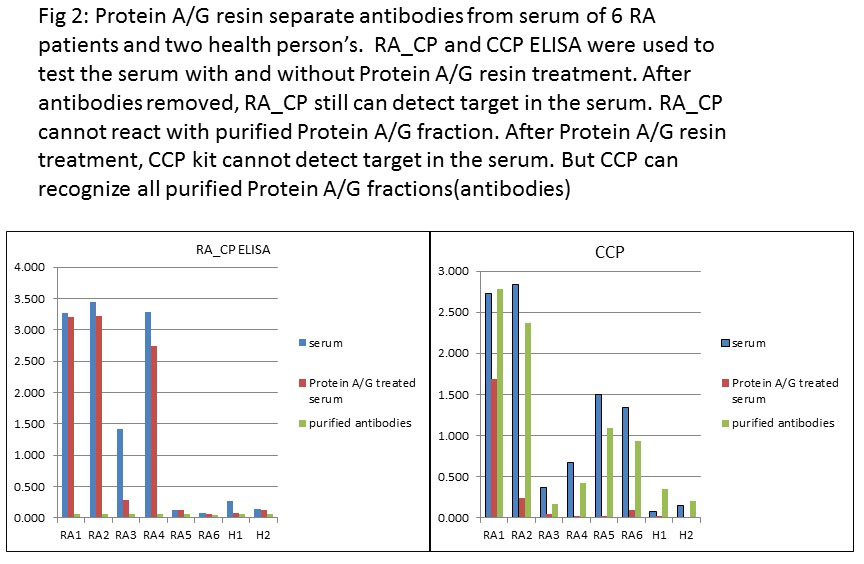Session Information
Date: Sunday, November 10, 2019
Title: RA – Diagnosis, Manifestations, & Outcomes Poster I: Risk Factors, Predictors, & Prognosis
Session Type: Poster Session (Sunday)
Session Time: 9:00AM-11:00AM
Background/Purpose: Rheumatoid arthritis (RA) is a systemic autoimmune disease characterized by chronic joint inflammation that ultimately leads to joint destruction. Diagnosis of RA is important as new therapies can halt the disease progression in its early stages. In the past decade, ACPA measured by antiCCP assay was widely accepted as RA diagnostic biomarker. ACPAs are auto-antibodies produced against proteins of the body modified by citrullination. Although anti-ACPA test specificity reaches around 95%, about 20 to 40 percent of RA patients are ACPA negative.
Methods: Peptides with Multiple Citruline Similar Motif (MCSM) were synthesized and used to produce anti-MCSM antibodies. Anti-MCSM antibody recognized MCSM in the citrullinated proteins such as fibrogen, vimentin and enolase which were found in the RA patients. RA_CP ELISA was developed using anti-MCSM antibodies. Clinical samples were collected under the Investigational Review Board approval protocol and RA patients met 2010 ACR classification criteria for RA. Receiver operating characteristic (ROC) curve was used for the analysis of optimal cut-off point for the evaluation of diagnostic capacity. CCP2 assay kits were purchased from European Diagnostic. Protein A/G resin was used to extract IgG/IgM from serum samples.
Results: Among 25 Anti-ACPA negative RA samples, citrullinated antigens recognized by anti-MSCM antibodies were detected in 11 samples (44%). In the anti-ACPA+ samples, 95.5% samples were RA_CP positive. After antibodies in anti-ACPA+/RA_CP+ samples were depleted by Protein A/G resins, significant RA_CP signals were remained in the serum fraction and no signal was detected in the Protein A/G fraction. However, Anti-CCP signals were greatly reduced in Protein A/G treated serum and its signals were recovered in Protein A/G fraction. A total of 350 clinical samples were further analyzed by anti-ACPA and RA_CP Elisa. The sesentivity for RA_CP is 86.0% which is higher than anti-ACPA assay while maintaining the specificity at 96.3%.
Conclusion: It was well known that up to 40% RA patient samples were ACPA negative and the diagnostic sensitivity in this population needs to be improved to meet patient’s clinical management. In this study, anti-MCSM antibodies were developed and detected citrullinated antigens with MCSM in the serum samples. Protein A/G experiments clearly demonstrated that MCSM antigen can be present in the free form or with antigen/antibody immune complex. It was very interesting that MCSM antigens were found in 44% of anti-ACPA- RA samples and over 95% anti-ACPA+ RA samples. Since antigen normally emerges earlier than the antibody, theoretically, RA_CP could be used in early RA diagnosis which needs further study to confirm.
To cite this abstract in AMA style:
ru z, Chen X, huang X, Lou J, peng Y, Yang X. Citrullinated Antigens with Multiple Citruline Similar Motif Could Be Used for RA Diagnosis [abstract]. Arthritis Rheumatol. 2019; 71 (suppl 10). https://acrabstracts.org/abstract/citrullinated-antigens-with-multiple-citruline-similar-motif-could-be-used-for-ra-diagnosis/. Accessed .« Back to 2019 ACR/ARP Annual Meeting
ACR Meeting Abstracts - https://acrabstracts.org/abstract/citrullinated-antigens-with-multiple-citruline-similar-motif-could-be-used-for-ra-diagnosis/


